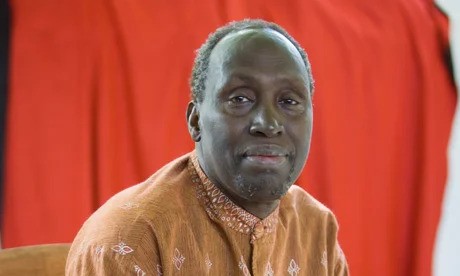
Few writers shaped African literature—and challenged colonial narratives—like Ngũgĩ wa Thiong’o. Born in colonial Kenya, imprisoned for his art, and later exiled, Ngũgĩ’s life and work remain a powerful testament to the enduring struggle for cultural identity, linguistic freedom, and decolonisation through storytelling.
Early Life and Education
Ngũgĩ wa Thiong’o was born James Ngugi in 1938 in Limuru, Kenya, during British colonial rule. Raised in a large Kikuyu family, he experienced firsthand the upheaval of the Mau Mau rebellion and the brutalities of colonialism—experiences that deeply influenced his writing.
He studied at Makerere University in Uganda and later at the University of Leeds in the UK, where he immersed himself in both African and Western literary traditions.
Literary Career: From Colonial Shadows to African Identity
Ngũgĩ rose to prominence with his debut novel, Weep Not, Child (1964)—the first novel in English by an East African writer. This was followed by The River Between (1965) and A Grain of Wheat (1967), which explored Kenya’s colonial past and the dilemmas of independence.
He later wrote Petals of Blood (1977), a searing critique of neocolonial betrayal in post-independence Kenya.
Art, Activism, and Imprisonment
In 1977, Ngũgĩ co-wrote and staged a politically charged play, Ngaahika Ndeenda (I Will Marry When I Want), in Gikuyu with local villagers. The Kenyan government saw it as a threat—and imprisoned him for a year without trial.
While in prison, he wrote the groundbreaking novel Devil on the Cross on toilet paper. After his release, his continued criticism of the Kenyan regime forced him into exile—first in Britain, then the United States.
Language as Liberation
After prison, Ngũgĩ made a radical decision: to abandon English and write solely in Gikuyu, his native language. His landmark essay collection, Decolonising the Mind (1986), argued that language is the carrier of culture—and that colonial languages continue to oppress African thought.
“The bullet was the means of the physical subjugation. Language was the means of the spiritual subjugation.” — Ngũgĩ wa Thiong’o
This stance made Ngũgĩ a revolutionary figure—not just a novelist, but a theorist of linguistic freedom and cultural survival.
Death and Legacy
Ngũgĩ wa Thiong’o passed away on May 28, 2025, in the United States, at the age of 86. His death marked the end of a towering literary and intellectual era, but his influence continues to echo across continents.
Writers, scholars, and activists around the world paid tribute to his unrelenting commitment to justice, language, and African identity. Many regard him as Africa’s greatest living writer—a title he carried with humility and purpose until the end.
Notable Works
Weep Not, Child (1964)
The River Between (1965)
A Grain of Wheat (1967)
Petals of Blood (1977)
Devil on the Cross (1980)
Decolonising the Mind (1986)
Dreams in a Time of War (2010)
The Perfect Nine (2020)
Why Ngũgĩ Still Matters
Ngũgĩ taught generations that African stories belong in African languages, and that reclaiming voice is a radical act of self-definition. His life was not just one of art, but of resistance—against colonialism, dictatorship, and erasure.
He remains a beacon for African writers, thinkers, and students reclaiming their histories and shaping new futures.
Let me know if you’d like this adapted for print, academic citation, or a tribute post for social media.

